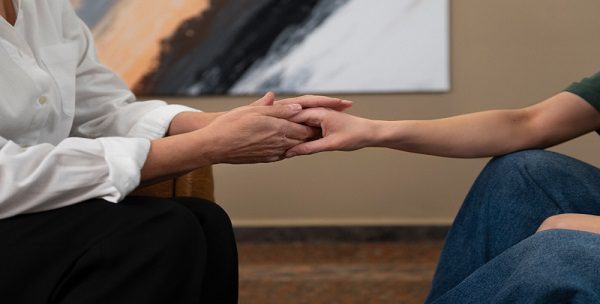
How Couple Counseling Can Help Rebuild Trust and Connection
March 19, 2025Healing from trauma appears like piecing together the shattered mirror, which is complex, fragile, and painfully reflective. Watching someone you love undergo the process might be stressful. It leaves you wondering how to help them recover. Your presence might be so fruitful that you fail to realize it. However, knowing how to steer through those uncharted waters might build meaningful support for their recovery. Offering your helping hand without having to cross the boundaries takes intention and thoughtfulness. It is not just about fixing the pain, but walking alongside your loved one heals.
The Path to Recovery: Guidance for Supporters
Two lives get critically twirled in between whenever trauma strikes. The individual who is suffering carries the overburden of their past, while those around them grapple to find ways to help instead of causing any further damage. Identifying the intricate web of trauma counseling and the role a therapist plays can help create a safe space for your loved one to heal.
Creating a Safe and Supportive Environment
Healing starts wherever there is safety. A secure space without any pressure or judgment helps the emotions unfold naturally. Simple gestures of calm tone, respect for boundaries, and reassuring presence create a perfect backdrop to encourage openness.
Uplifting your loved ones emotionally is extremely important. However, forceful conversations or pressing for more details can be counterproductive. Trauma recovery counselors emphasize autonomy for the survivors in their healing process. It is important to respect silence as much as the words spoken. These professionals highlight the real potential of nonverbal support by being present, offering a comforting touch if welcoming, or just making space for moments of stillness.
Educating Yourself on Trauma and Recovery
Real support involves an in-depth understanding. Studying thoroughly about trauma therapy, attending trauma-dedicated workshops, or consulting with therapists offers critical insights into the complexities your loved one faces. Educating oneself helps in dismantling misconceptions regarding trauma and establishing empathy instead of frustration.
Myths that surround trauma often set unrealistic expectations. There is no fixed timeline for recovery, nor does it mean getting back to your previous self. Trauma therapy does not ease past wounds; however, it assists people in creating a future where they are not defined by pain.
Encouraging Professional Support Without Pressure
Professionals often design trauma recovery treatment. Suggesting gentle therapy and not pushing it as a need can preserve trust. A loved one might be hesitant to seek professional help, fearing the risk of judgment. It is important to know how to phrase this to your loved one. Instead of a solution of being broken, make it an option for self-empowerment. This will prove beneficial and effective.
Few people might choose individual therapy, while the rest would find comfort in group counseling. It is best to respect their choice, even if there is any trial and error involved. By not making therapy the main focus of your conversation, you can keep the discussions pressure-free and balanced.
Practicing Active and Compassionate Listening
Listening involves more than just hearing the words. Trauma survivors usually speak in tonal shifts, pausing, and using body language. Offering them a free space for expression without interruption, not rushing to fix things, and offering unsolicited advice helps to build trust.
Providing reassurance that the angst is legitimate, regardless of how irrational or painful it might feel, can forge strong connections. Saying things like “I hear you” or “I’m here for you” rebuilds support without diminishing someone’s experiences. Trauma therapy, like EMDR therapy, is about validating, which is not about agreeing to acknowledge the reality of someone else without judgment.
Encouraging Healthy Coping Mechanisms
Healing includes more than just processing the past. It is about rediscovering joy in the presence. Encouraging activities that add comfort, whether it is yoga, painting, music, or writing, can rebuild emotional strength. Trauma therapists often suggest mindfulness practices, grounding exercises, and breathwork as effective for emotional regulation.
Gentle reminders to take care of can help. Basic check-ins like “Did you eat today?” or “Would you like to go for a walk together?” encourage well-being without being uptight. Providing companionship in these activities helps to alleviate the loneliness that is often a byproduct of trauma recovery.
Respecting Boundaries Without Taking Distance Personally
Establishing boundaries is an essential component of recovery. Some days, a loved one might want to reach out, and other days, solitude might seem like the best option. If you take distance personally, people can feel pressured and guilty for needing space.
A trauma recovery counselor would point out how imperative it is to find a balance in offering support, a quality of presence without strain. Rather than asking, “Why don’t you want to talk?” a more supportive response might be, “I’m always here whenever you want to talk.” These more subtle shifts in language inspire a sense of security rather than obligation.
Managing Emotional Triggers with Care
Triggers often surface when you least expect them. A sound, phrase, scent, or place may bring back memories of distress. Identifying the potential triggers and responding patiently instead of getting irritated may leave a huge positive impact.
Knowledge about trauma responses like irritability, withdrawal, or sudden emotional shifts can help avoid any misinterpretation. The trauma therapy specialists highlight these reactions as not the present moments but reflections of past wounds that are resurfacing. Staying calm and offering reassurance in these moments can help rebuild trust.
Prioritizing Your Mental Well-Being
Being with someone who is recovering from trauma can be emotionally taxing. We all have to take care of ourselves because if we wear ourselves out trying to help others, we stop being able to help those others. Only when we see support from a therapist, join a support group, or practice self-care will we have the emotional space and ability to support a loved one.
Boundaries matter for both people. Trauma recovery treatment is not about doing someone else’s laundry; it is about carrying someone else’s pain for them while they walk beside you to recovery. The journey of a loved one should not be placed above our peace. Hold on to our happiness, hobbies, and downtime to keep us from burnout.
Conclusion
Supporting a loved one through the journey of trauma recovery involves a lot of patience, presence, and compassion. Real healing takes form when individuals feel supported, safe, and motivated to travel through their path at their own pace. The importance of professional guidance cannot be overstated, as it helps to make trauma recovery effortless. If you or your loved one needs expert help, connect to a qualified trauma counseling professional. Contact us today to learn more about how we help support recovery!
Frequently Asked Questions
How Can I Help a Loved One Feel Understood During Trauma Recovery?
Always initiate open, unhurried conversations, recognize their feelings, validate their experiences, and resist the impulse to give them immediate solutions.
Is It Normal for Trauma Survivors to Struggle With Decision-making?
Well, trauma can lead to self-doubt and anxiety. Providing patience and support while giving them the freedom to make choices will build confidence and independence.
How Can I Support Them Without Making Them Feel Dependent?
It is important to guide rather than control. Allow your loved ones to take small steps toward independence, knowing support is still available.





